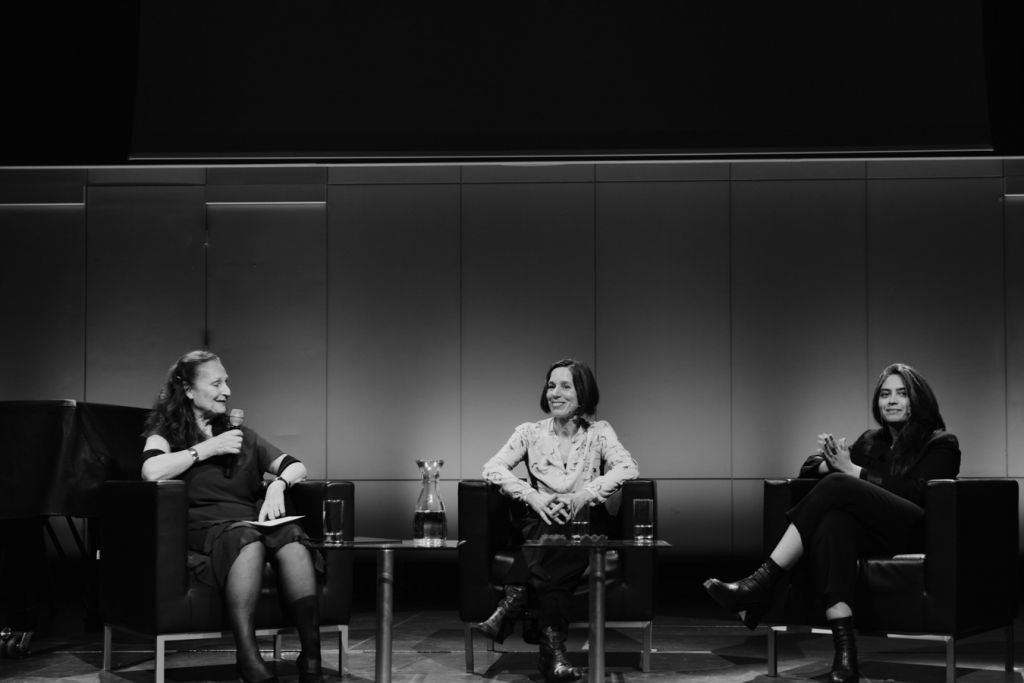“Amenca ketane” is a maxim of the Roma movement in Austria and means “collectively, together”. The MMRC Lecture on 16 November 2023 at the mdw’s Joseph Haydn-Saal took these Romanes words as a motto under which to address the history of this people’s traumas and their use of music to overcome them: amenca ketane. Histories of Trauma, Music and Romani Empowerment.

The words “amenca ketane” originally stood at the beginning of a song that was made publicly known in 1990 by the concentration camp survivor Ceija Stojka: Amenca ketane sam zurale – collectively, together, we are strong. Ceija Stojka was a pioneer of the Roma movement in Austria, and her 1988 memoire Wir leben im Verborgenen [We Live in Seclusion] was the first publication in which a Romni processed her concentration camp trauma in writing. From that point onward, the Roma/Romnja began emerging from said “seclusion”—with the first official Roma association being founded in Oberwart in 1989 followed by two Viennese associations in 1991. A common political goal was official recognition of the Roma/Romnja as Austria’s sixth national ethnic minority group, an objective that could only be collectively achieved. The lion’s share of Austrian Roma/Romnja perished in the Nazis’ extermination camps. The survivors were denied compensation after the war, and it was only in 1988 that the Roma camps at Lackenbach and Wals were recognised as having been concentration camps. Aside from negative prejudices, Austrian society knew virtually nothing about the Roma/Romnja. Historians such as Selma Steinmetz and Erika Thurner had already begun to appraise the concentration camp-related history of the Roma/Romnja, however, and the early 1990s then saw the field of linguistics (Mozes Heinschink, Dieter Halwachs) commence intense study of the variants of Romanes spoken in Austria while ethnomusicology made its contribution by researching and publishing the diverse forms of musical expression practised by Roma/Romnja in Austria (Christiane Fennesz-Juhasz, Ursula Hemetek). These were necessary prerequisites for recognition as an ethnicity. In Austria, such recognition is associated with certain collective rights—including schooling in one’s own mother tongue, the establishment of an advisory council at the Austrian Federal Chancellery, and entitlement to financial support. This objective was achieved on 16 December 1993.

The Music and Minorities Research Center (MMRC) at the mdw frequently addresses societally relevant themes in research projects as well as in events such as the MMRC Lectures, which have been held annually since 2019. This year’s MMRC Lecture took the 30th anniversary of official Roma/Romnja recognition in Austria as an opportunity to engage with the topic of Roma and music. The focus here was on this people’s continual struggles and on how they deal with traumas stemming from a long history of discrimination and genocide. Music’s ability to play a role as a means of remembering, healing, and also collective empowerment was addressed both in the lectures and in the musical contribution. The evening’s protagonists consisted exclusively of Romnja from various parts of the world. The keynote, entitled “Sound, Race, and Romani Subjectivity”, was delivered by the ethnomusicologist Ioanida Costache (Stanford University); Costache was born in the USA, but her parents come from Romania—which is also her preferred region in which to research. Using examples of Romanian Roma music, she surveyed the role played by musical performance in the creation of intimate spaces in which processes of belonging, healing, and self-formation can play out. The impressive musical examples from field research were embedded theoretically in a way that was quite convincing. The response, entitled “The fight for justice and recognition of the Roma Holocaust”, was delivered by the Austrian political scientist and long-time Roma activist Mirjam Karoly (Romano Centro). In light of historical developments and with reference to examples from Germany and Austria, Karoly spoke about the significance of the struggles to achieve recognition of the Roma Holocaust for the Roma civil rights movement.
The artistic performance this time around was by the Viennese Romnja rap duo Mindj Panter. Simonida and Sandra Selimović have roots in Serbia, live in Vienna, and performed mostly in a mix of languages (Romanes, German, Serbian, and English). Their musical message is feminist, antiracist, and resistant, standing for Roma/Romnja empowerment. Their performance at the Joseph Haydn-Saal was unusual insofar as the setting was not exactly destined for this type of music. They did, however, succeed in “conquering” this hall—a place that stands for “high culture”, classical music, and the establishment—and in wowing the audience. Musical places and institutions such as the mdw are possessed of a strong symbolic power, which is precisely why it is important to open them to minorities. “Amenca ketane”, as the message of this evening, was given an impressive academic and artistic presentation thanks to collaboration between Romnja from different regions of the world. Change is possible, and music’s power to effect change—through its performance and/or its academic contextualisation—represents a significant tool in ongoing efforts to eliminate inequality and cultivate a minority-friendly society.
Watch the MMRC Lecture at the mdwMediathek.

